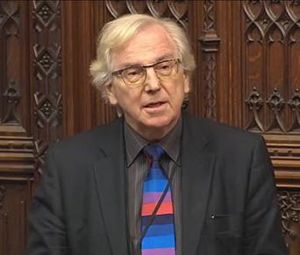Stewart Sutherland, Baron Sutherland of Houndwood facts for kids
Quick facts for kids
The Lord Sutherland of Houndwood
|
|
|---|---|

In the House of Lords chamber, 2016
|
|
| President of the Royal Society of Edinburgh | |
| In office 2002–2005 |
|
| Preceded by | Sir William Stewart |
| Succeeded by | Sir Michael Atiyah |
| Personal details | |
| Born | 25 February 1941 |
| Died | 29 January 2018 (aged 76) |
| Alma mater | University of Aberdeen Corpus Christi College, Cambridge |
Stewart Ross Sutherland, Baron Sutherland of Houndwood (born 25 February 1941 – died 29 January 2018) was an important Scottish academic and public servant. He was known as one of Britain's most respected thinkers about religion. He was also a member of the House of Lords, which is part of the UK Parliament, and he didn't belong to a specific political party.
Contents
Stewart Sutherland's Early Life and Education
Stewart Sutherland went to school at Robert Gordon's College. In 1963, he finished his studies at the University of Aberdeen with top marks in Philosophy. Two years later, in 1965, he earned another degree in the Philosophy of Religion from Corpus Christi College, Cambridge.
Stewart Sutherland's Career Highlights
After university, Stewart Sutherland started his career as a philosophy teacher at the University College of North Wales. Three years later, he moved back to Scotland to teach at the University of Stirling. At Stirling, he helped create the Religious Studies department.
In 1977, he became a Professor at King's College London, teaching the history and philosophy of religion. He later became a leader there, first as vice-principal in 1981 and then as principal in 1985.
In 1990, Stewart Sutherland became the vice-chancellor (a top leader) of the University of London. Two years later, he was chosen to be the chief inspector of schools, meaning he was the main person in charge of checking how schools were doing.
He then became the principal and vice-chancellor of the University of Edinburgh, where he worked until 2002. During his time as principal, the university improved a lot in teaching and research, and he helped make good changes. From 2002 to 2008, he was also the head of Gresham College.
Stewart Sutherland was recognized for his work in many ways. In 1992, he was chosen to be part of the British Academy, a group of leading experts in the humanities and social sciences. In 1995, he became a Fellow of the Royal Society of Edinburgh, a famous Scottish academy. That same year, he was also made a knight by the Queen. He later became the president of the Royal Society of Edinburgh in 2002. He also served on important groups that funded higher education in England and Hong Kong.
In 1997, the government asked him to lead a special group called a Royal Commission. This group looked into how older people should be cared for over a long time. His group suggested that the government should pay for all care for older people, even if they had long-term mental health issues. This idea was used by the Scottish government, but not in England and Wales.
Stewart Sutherland's Philosophy and Ideas
As a philosopher of religion, Stewart Sutherland thought a lot about how people can still be good and responsible in societies where many different beliefs exist. He wondered how people could live together morally without relying on old ways of thinking that might cause arguments.
He was inspired by his teacher, Donald M. MacKinnon. Stewart Sutherland used clear and careful thinking from the Anglo-American style of philosophy. He also connected these ideas with the thoughts of writers and philosophers from Europe.
In his books, like Atheism and the Rejection of God (1977) and Faith and Ambiguity (1984), he explored the ideas of thinkers such as Dostoevsky, Kierkegaard, Camus, and Weil. His lectures at Oxford University, published as God, Jesus and Belief (1984), looked at many intellectual, moral, and life questions in modern religious philosophy. He argued that Christian ethical and faith traditions are still valuable, even when old beliefs are changing.
He also helped promote the study of religion through two important books he edited: The Philosophical Frontiers of Christian Theology (1982) and Religion, Reason and the Self (1989).
Stewart Sutherland also helped improve the study of world religions in schools and universities. He edited World Religions (1988) and The Study of Religion: Traditional and New Religions (1991). These books helped people understand and respect different faiths.
Awards and Special Recognitions
Stewart Sutherland was made a Knight Bachelor in 1995. This meant he could use the title "Sir."
On 29 June 2001, he was given a special title for life: Baron Sutherland of Houndwood. This allowed him to sit in the House of Lords. The next year, he was chosen to be the president of the Royal Society of Edinburgh.
In 2002, he received another high honor, becoming a Knight of the Thistle. He also received many honorary degrees from different universities. In 2004, he became a Fellow of Birkbeck, University of London. On 31 May 1996, he received an honorary doctorate from Uppsala University in Sweden.
In 2005, he joined the team that creates the Encyclopædia Britannica, a very famous encyclopedia.
Artistic Recognition
There is a bronze statue (a bust) of Lord Sutherland. It was made by Vincent Butler and can be found at the top of the stairs leading to the Playfair Library at Old College, University of Edinburgh.
See also
- List of Vice-Chancellors of the University of London
 | Mary Eliza Mahoney |
 | Susie King Taylor |
 | Ida Gray |
 | Eliza Ann Grier |


